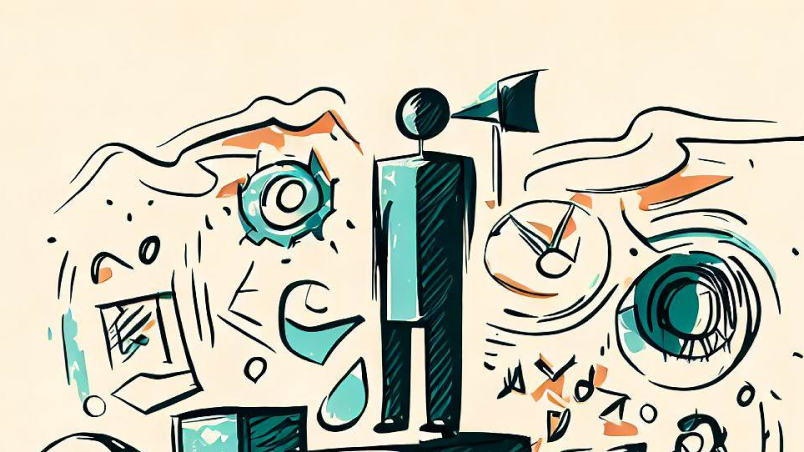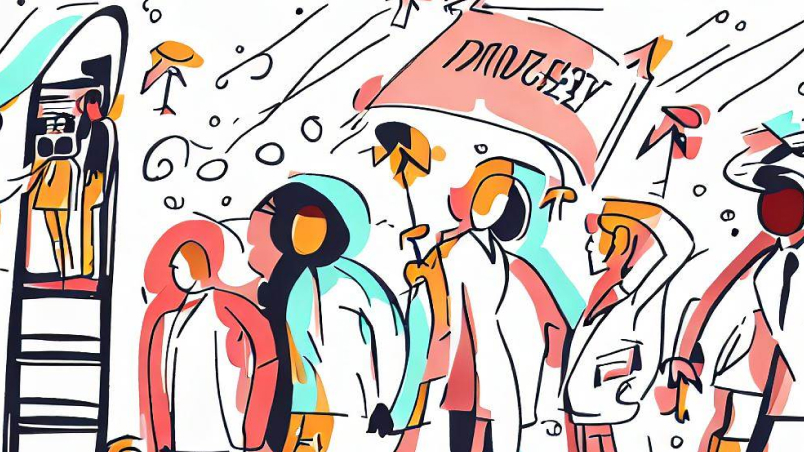Help your team leave
As an agency leader, founder, manager or anyone who hires: employee loyalty is your ideal.

Say it with me: no one on your team will be there forever.
If you want high-performing teams who share your drive and passion, help your employees outgrow you. Give them the opportunity to develop their personal brand and provide input and advice on freelancing, job hunting or portfolio building.
It might seem counter-intuitive, but it’s worth it.
The dream of any employer is to have employees who are 100% aligned on their company’s culture and vision, sticking around for several years helping achieve it.
While that blind dedication might have been more common for previous generations, today – and especially in tech – long-term job loyalty is no longer the norm but an exception.
The average job tenure in the UK is hovering around 1.6 years, trending lower since the pandemic and alongside a shift to remote or hybrid setups. More and more knowledge workers are subscribing to a ‘gig’ or portfolio career path where the pursuit of meaningful work wins over loyalty and, in many cases, financial reward.
So how might agency and/or product leaders excel in today’s low loyalty, high turnover job market?
Make peace with the fact that your best employees will leave.
In the limited time you have with your great teams, drive a positive experience by creating mutual positive outcomes. Help your employees succeed after you and you’ll have happier, more driven employees when they’re with you.
How?
Help and co-build personal brands
Personal brands are incredibly powerful. A CV, a personal website or even a strong stance on industry topics all contribute to one’s personal brand.

Designers tend to rely on personal brands to showcase their unique talents. Whether a portfolio, their writing or another employable craft, portfolios, blogs or websites are a proverbial shop window for prospective employers.
As an employer, helping to grow your team’s personal brands could be one of the most valuable (and perhaps counterintuitive) things you do. Employees with strong personal brands create a network effect. They attract people interested in their work or approach, which in turn can lead prospective customers to your company or agency through affiliation.
Rather than try to command and control employees and asking them to toe the company line, fostering their personal brands can empower and enable.
Ways to amplify your team’s personal brand
- 📣 Help to find potential public speaking opportunities that are aligned to your agency’s current or desired work, industry or sector.
- ✍️ Actively encourage public writing. The ability to form cogent and coherent thoughts about an industry topic doesn’t come easily to everyone. If you have an employee who shows an interest, jump on it. Find publications, newsletters or blogs for them to share their thoughts.
- 🙊 Top tip: Don’t censor. Everyone has a voice. Good staff won’t disparage the company they work for.
- 🔦 Spotlight your team. If your company has a platform of any sort, highlight your staff to give them a kickstart.
Build a mutually-beneficial portfolio
A subset of a strong personal brand is a great portfolio.
As designers, a portfolio does a lot of the heavy lifting… long before an actual face-to-face or screen-based interview takes place.

Helping team members create a strong portfolio might feel awkward, but in the long game it’s mutually beneficial. The network effect again applies here. A strong designer will go to great lengths to create a compelling story that outlines their processes, approaches and outcomes for a project they worked on and enjoyed at your company.
With a growing audience of their own, your team member’s ability to communicate their abilities is a mutually beneficial skillset.
Providing the time and space to hone these skills makes for staff who are proud of their work and – importantly – can articulate their accomplishments in a compelling and engaging way.
Tips for strong employee portfolios
- 🩺 Portfolios are like the proverbial cobbler’s shoes. If a team member is too busy doing the work, they can’t find the time to create a portfolio. Help by carving out time and space for your them to consider how they’d publicly talk about their work with you, via a ‘portfolio clinic’.
- 🎭 Provide critique on your team member’s portfolio, just like a design review. Be objective and open, and avoid censorship or heavy editing.
- 📖 Focus on the narrative, with a strong focus on outcomes and not pretty pictures.
Building skills for career growth
One of the increasingly common questions I get asked when hiring designers is ‘do you have a career framework’? And it’s a great question.

Having the tools in place to help your team progress in their careers is becoming the expectation today, no matter the size of your organisation.
Career development frameworks help track and identify gaps in an employee’s knowledge and skills. Finding these gaps and helping your team progress their careers can benefit all involved.
While the tracking and indexing of an employee’s progression framework may differ per framework or org, the outcomes remain the same: Frameworks help identify what training, opportunities or focus is needed to progress a team member’s career from point A to B.
The irony isn’t lost here: career progression frameworks hasten an employee’s time with you by equipping them for their next role. But that’s the point.
By co-designing a career, you’re building long-term trust and empowerment with your team. Career progression tracking might highlight a designer who could benefit from public speaking training, or a developer who might benefit from design courses.
These are all opportunities that can benefit your organisation in the short-term, and your team members in the long term.
Play the long game
Hiring, nurturing and caring for a team who will one day leave you is a necessary pain in life. Turnover isn’t a bad word, it’s expected. As an employer or leader the sooner you accept this golden rule, the better.

By helping your team become their best selves, your organisation can only benefit. More, the staff who appreciate it will pay back in kind, be it through strong work, loyalty, or both.
Helping to build their personal brands, their portfolios and their careers is a more modern and empathetic approach to employment.
Long gone are the ‘command and control’ concepts of industrial era employment, and rightly so.
July 1st, 2023